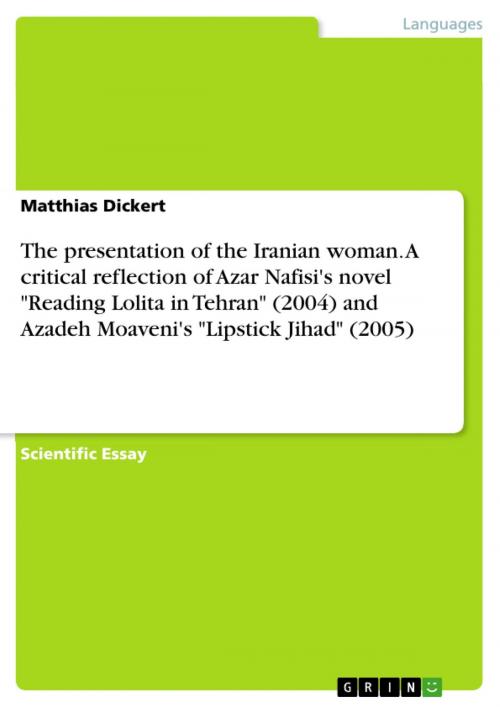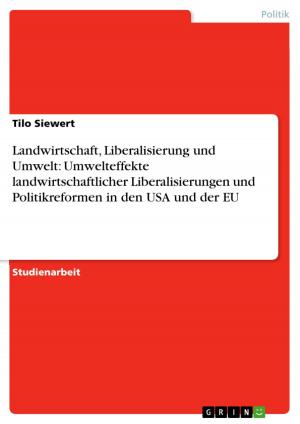The presentation of the Iranian woman. A critical reflection of Azar Nafisi's novel 'Reading Lolita in Tehran' (2004) and Azadeh Moaveni's 'Lipstick Jihad' (2005)
Fiction & Literature, Literary Theory & Criticism| Author: | Matthias Dickert | ISBN: | 9783668278394 |
| Publisher: | GRIN Verlag | Publication: | August 19, 2016 |
| Imprint: | GRIN Verlag | Language: | English |
| Author: | Matthias Dickert |
| ISBN: | 9783668278394 |
| Publisher: | GRIN Verlag |
| Publication: | August 19, 2016 |
| Imprint: | GRIN Verlag |
| Language: | English |
Scientific Essay from the year 2016 in the subject Literature - Middle East, , language: English, abstract: Azadeh Moaveni' s novel 'Lipstick Jihad' (2005) is a typical novel of female Muslim writers disposing of a Muslim and Western background. This (double) insight into two seemingly opposing worlds enables author and reader alike to get a deeper insight into Muslim characters who are often torn between these two extremes which many Muslim authors describe as a personal dilemma in form of a jihad. Jihad here is used it its basic meaning which corresponds a personal struggle based on a Muslim background (here the Iranian diasporic situation in the USA) which is accompanied by the nostalgia for and belonging to Iran as a homeland. The hybrid which is a result from this and which is so typical for Muslim writing of the second generation in general is also reflected in 'Reading Lolita in Tehran' (2004) the second novel analysed here. This 'hybrid condition' is strongly reflected in the personal, cultural and religious odyssey most Muslim characters experience. This especially goes for women since they are still portrayed in their inferior role. The common basis of both novels can therefore be seen in the influence of the Iranian setting in general and the role of the Iranian Revolution and the emerging Iranian Republic in particular which both strongly shaped this nation and her inhabitants while also throwing light on the (mostly difficult) life in Iran. It is also this specific situation of Iran which many female authors use as a setting which disposes of a dramatic background which is used as an underlying dramatic element for the narration as such.
Matthias Dickert, geb. 1955, ist von Beruf Gymnasiallehrer (Englisch, Sport, katholische Religion). Studium an der Philipps Universität/Marburg und Durham University (GB). Forschungsschwerpunkt: Migrationssoziologie/ Islamische Autorinnen und Autoren im gegenwärtigen englischen Roman. Zahlreiche Veröffentlichungen (z.B. Blickpunkt der Forschung, Zeitschrift für Interdisziplinäre ökonomische Forschung, GRIN Verlag); Vorträge an europäischen Hochschulen. Doktorarbeit über das Thema Islam, Islamic Fundamentalism and the Question of Identity in Muslim Writing.
Scientific Essay from the year 2016 in the subject Literature - Middle East, , language: English, abstract: Azadeh Moaveni' s novel 'Lipstick Jihad' (2005) is a typical novel of female Muslim writers disposing of a Muslim and Western background. This (double) insight into two seemingly opposing worlds enables author and reader alike to get a deeper insight into Muslim characters who are often torn between these two extremes which many Muslim authors describe as a personal dilemma in form of a jihad. Jihad here is used it its basic meaning which corresponds a personal struggle based on a Muslim background (here the Iranian diasporic situation in the USA) which is accompanied by the nostalgia for and belonging to Iran as a homeland. The hybrid which is a result from this and which is so typical for Muslim writing of the second generation in general is also reflected in 'Reading Lolita in Tehran' (2004) the second novel analysed here. This 'hybrid condition' is strongly reflected in the personal, cultural and religious odyssey most Muslim characters experience. This especially goes for women since they are still portrayed in their inferior role. The common basis of both novels can therefore be seen in the influence of the Iranian setting in general and the role of the Iranian Revolution and the emerging Iranian Republic in particular which both strongly shaped this nation and her inhabitants while also throwing light on the (mostly difficult) life in Iran. It is also this specific situation of Iran which many female authors use as a setting which disposes of a dramatic background which is used as an underlying dramatic element for the narration as such.
Matthias Dickert, geb. 1955, ist von Beruf Gymnasiallehrer (Englisch, Sport, katholische Religion). Studium an der Philipps Universität/Marburg und Durham University (GB). Forschungsschwerpunkt: Migrationssoziologie/ Islamische Autorinnen und Autoren im gegenwärtigen englischen Roman. Zahlreiche Veröffentlichungen (z.B. Blickpunkt der Forschung, Zeitschrift für Interdisziplinäre ökonomische Forschung, GRIN Verlag); Vorträge an europäischen Hochschulen. Doktorarbeit über das Thema Islam, Islamic Fundamentalism and the Question of Identity in Muslim Writing.















